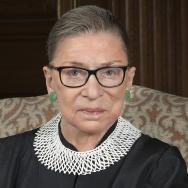When Ruth Bader Ginsburg visits the University of Chicago on Sept. 9, it will be the latest in a series of appearances on campus by U.S. Supreme Court justices.
Dean Katherine Baicker of the Harris School of Public Policy will host a conversation with Justice Ginsburg at 4:30 p.m. and award her the 2019 Harris Dean’s Award—given annually to an exceptional leader who has championed analytically rigorous, evidence-based approaches to policy, and who is an example for the next generation of policy leaders and scholars.
Six current or past justices have spoken at UChicago in the last decade, including two who taught at the University of Chicago Law School: Elena Kagan and the late Antonin Scalia. The events have reflected the Court’s range of ideological views, but they also have shown what unites the justices in their legal calling.
Ginsburg last visited UChicago in 2013, when she spoke with leading legal scholar Geoffrey Stone on the 40th anniversary of the landmark Roe v. Wade decision. Before a packed Law School audience, Ginsburg said that Roe “seemed to have stopped the momentum on the side of change.” She argued that the case was too far-reaching, making reproductive rights a more prominent target than it might have been after a more gradual approach. The Roe ruling, she added, was also centered on “the doctor’s right to practice...it wasn’t woman-centered, it was physician-centered.”
Learn more about past UChicago visits by Supreme Court justices below:











 —Prof. Chuan He
—Prof. Chuan He
